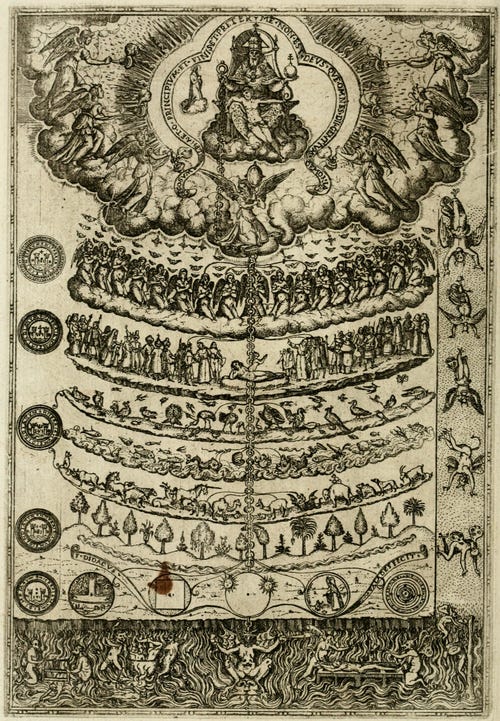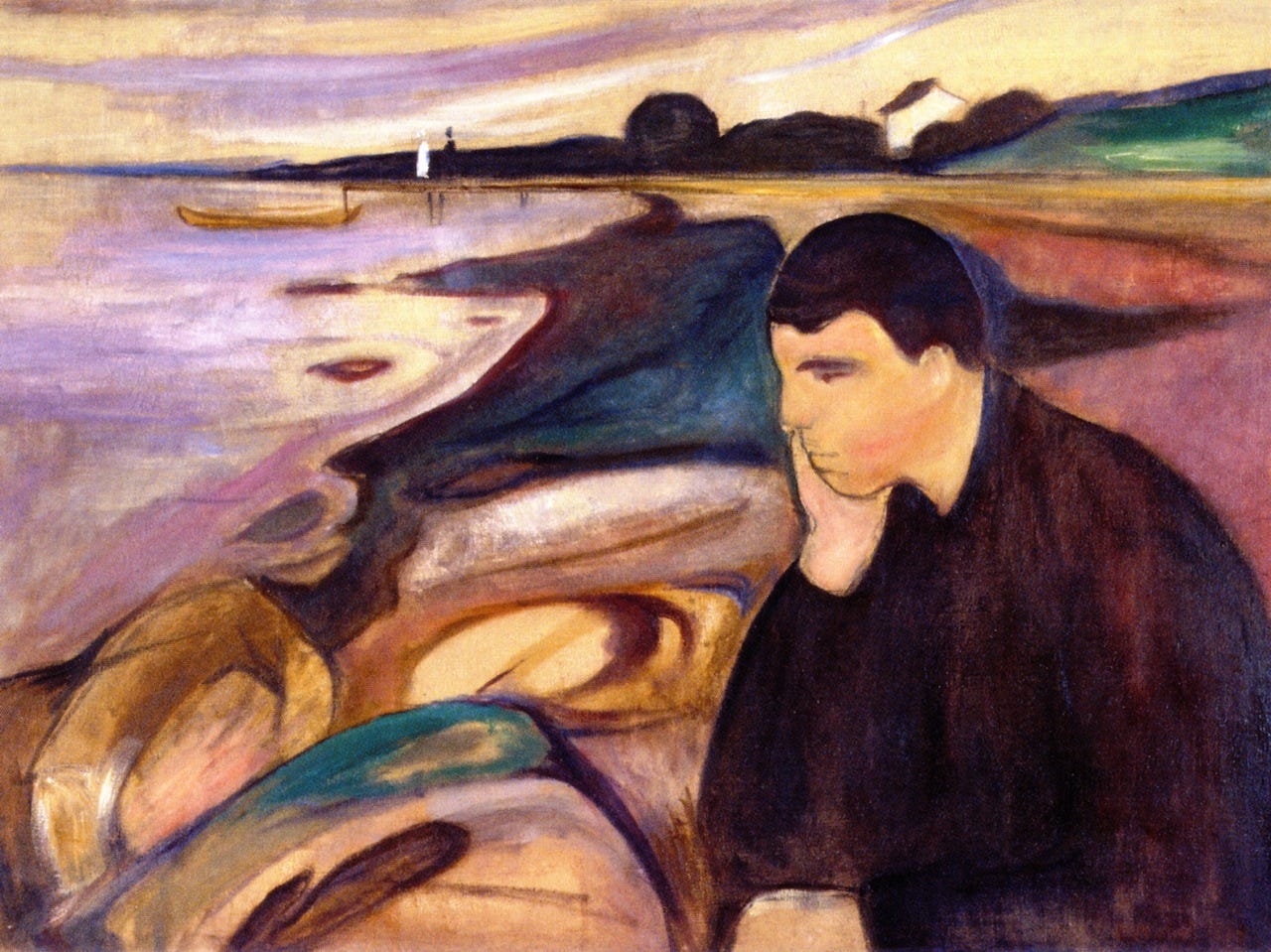We find the sense of life through articulating it. And moderns have become acutely aware of how much sense being there for us depends on our own powers of expression. Discovering here depends on, is interwoven with, inventing. Finding a sense to life depends on framing meaningful expressions which are adequate. There is thus something particularly appropriate to our condition in the polysemy of the word ‘meaning’: lives can have or lack it when they have or lack a point; while it also applies to language and other forms of expression. More and more, we moderns attain meaning in the first sense, when we do, through creating it in the second sense. (Sources of the self, Charles Taylor)
Introduction
Why do so many people today struggle with "finding their purpose"? What are we even supposed to be finding? Some say it's a feeling we're searching for, a feeling of coherence, of clarity. Others say that it is the Truth, and some point to "an accurate understanding of the world" (it may certainly be a mixture of the aforementioned). No matter what it actually is, we all know the feeling of not having it. And it is a topic which in modern times seems to be getting less philosophical attention, while nonetheless being of the same central importance as always. One can just look toward the forms of psychopathology of our times, and immediately see how they are linked to this "void" which we are all desperately looking to fill.
This is doubtlessly one of the most complex topics of humanity, hence no wonder our perplexity on the matter. Yet, in the following text I will try to shed some light on what human meaning really is, and in so doing hopefully be of help in taking you one step closer to goal of a meaningful life. In order to do so, we first need to take a brief detour to the past and ask how the question of meaning was perceived before our modern time, when people could inhabit frameworks of purpose that felt given rather than chosen.
The Old World: Meaning as Discovery
The life of the medieval peasant in the Middle Ages was marked by static and solid elements. Going to church on Sunday wasn't an expression of personal choice, instead it is better equated to the act of going to the supermarket for groceries in our modern life. The same goes for praying for health, for working the lord's land, for accepting one's station in life. These weren't decisions requiring deliberation or justification. They were simply what one did, as natural and unquestioned as eating when hungry.
When his child died of plague, the peasant grieved but didn't rage against meaninglessness. The death fit within a cosmic order he inhabited as surely as he inhabited his village. His role as farmer, his duties to lord and God, his place in the great chain of being were given elements of life. They simply were, as solid and given as the ground beneath his feet.
This static, given quality of life was supported by several key ideas within the dominant Christian doctrine. And so, the medieval peasant experienced the world in such a way because of the specific underlying beliefs that dominated and shaped his era. I will list some of these religious key components below (keep in mind this list is by no means exhaustive):

- The Great Chain of Being - a literal hierarchy stretching from God at the top, through angels, down to kings, nobles, clergy, peasants, animals, plants, and stones at the bottom. Every being had its designated place and purpose within this chain. It formed the backbone of the cosmic order.
- Divine Providence - the belief that God actively governs every detail of existence according to His plan. Nothing happens by chance; everything serves God's purposes, even if humans can't understand them.
- Sacred Time - the liturgical calendar that gave meaning to seasons, feast days, fasting periods. Time itself was structured around religious significance rather than personal goals.
- Natural Law - the idea that moral duties and social roles were written into the very fabric of creation, discoverable through reason and revelation, not invented by human will.
- Salvation Drama - all of history was understood as the unfolding story of Fall and Redemption, with each person playing their assigned role in this cosmic narrative.
More importantly, these religious aspects flowed through and shaped the social and political realms (just think of the divine right of kings for political legitimacy), making notions of upward class mobility impossible, a mere dream. If one was born a peasant, one had been given the role of peasant by god, and by extension, society. If one was born a nobleman, one would remain so too, unless something drastic were to happen. In such a world, how could personal achievement be relevant to a meaningful life? There simply was no room for the existential anxiety circling around questions in the form of "what should I do with my life?". The answer to those questions were already given.
A Hidden Demand of Late Modernity
In contrast, modern life has moved the narrative center from religious doctrine, to ourselves. Today we are expected to create our own narrative, in which we find our meaning and purpose. This is not a demand which has been made explicitly, many of us go through our entire life without understanding it. Yet it is nonetheless a demand from our secular and individualist society. With the freedom we have gained, we have lost the given, and moved into the realm of the chosen.

Life may fundamentally only be judged from a certain viewpoint. As Alasdair MacIntyre puts it: "the only criteria for success or failure in a human life as a whole are the criteria of success or failure in a narrated or to-be-narrated quest"1. Those who have not discovered the call to form our own quest-line, a call embedded in the modern human condition, are doomed to suffer in perpetual uncertainty and fragmentation.
The reason as to why this demand of creation remains hidden is simple. There is no entity which may communicate it, for the demand arises not from any authoritative figure or institution, but from the interplay of the values, culture and institutions our modern societies are built upon. It seems almost a paradox the way it is embedded in late modernity, when this very heritage holds freedom and well-being to be the most important factors. Anyhow, following this thread would move us further into dialogue with Isaiah Berlin's famous Two Concepts of Liberty2, where the ultimate question to ask becomes: is the state to intervene in a way which promotes the well-being, even though it does so at the cost of individual and collective liberties? But this is not the time for such a digression.
Instead I want to return to the call for choosing, for creating what before was given. This may certainly be done in a number of ways, or it might even happen without conscious effort for some lucky souls. Think of a person who grows up in a family where all love playing the piano, who spend entire days composing beautiful pieces, resulting in that she almost automatically builds her life narrative as a quest to be the greatest pianist of all time. This person would not often encounter the "void" of purposeless living. She may however certainly fall into a deep melancholy if she is unable to reach the goals the narrative demands of her.
Indeed, If she falls into the disgrace of failure, she will have moved through her entire life up until that point without sharpening her skill of narration, of quest-crafting. It won't be the same as starting anew, because as a newborn has a safety-net of loved ones. And society doubtlessly demands less of her than an adult. A middle-aged person may not have that support and lowered bar of expectations, thus making it a position which is difficult than just starting anew. Not impossible, but more an uphill battle for sure.
This is why it is crucial that our efforts align in understanding and articulating this particular aspect of the modern human life I have been discussing. We ought to be able to describe it as easily as nature's imperative to eat, because for all intents and purposes, both demands rest on the same level of importance if we are to promote the progress of humanity.
-
MacIntyre, A.C. (2007) After virtue: a study in moral theory. 3rd ed. Notre Dame, Ind: University of Notre Dame Press. Page 219. ↩
-
Berlin, I. (2000) The proper study of mankind: an anthology of essays. First Farrar, Straus and Giroux paperback edition. Edited by H. Hardy, R. Hausheer, and A. Kelly. New York: Farrar, Straus and Giroux. Page 191–241. ↩
Comments (0)